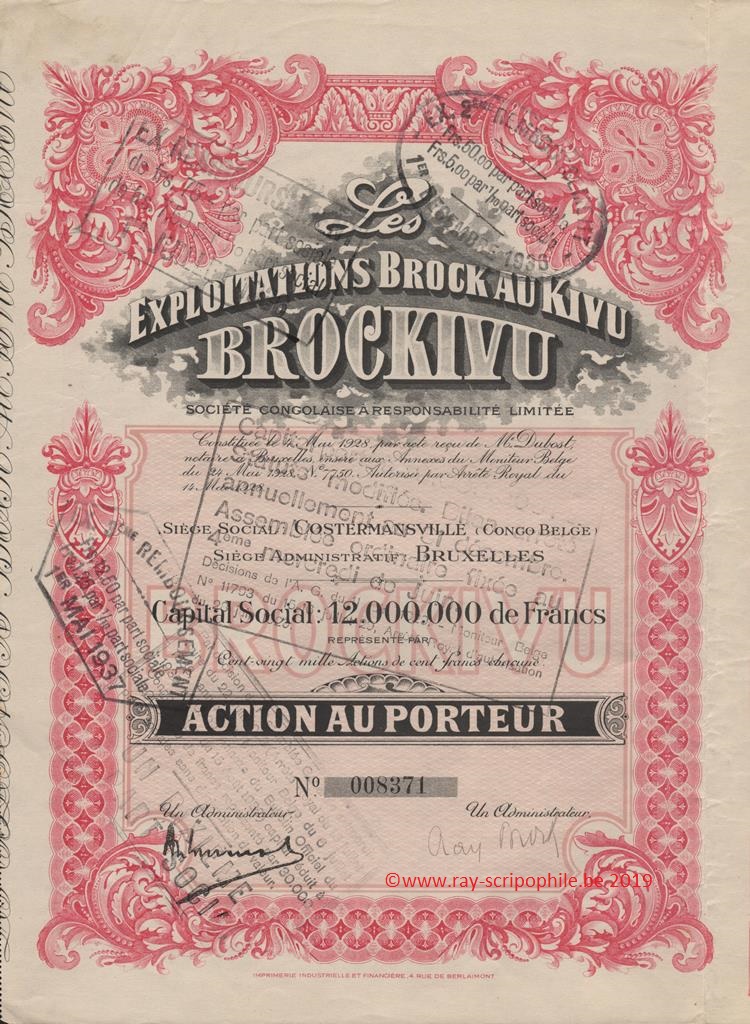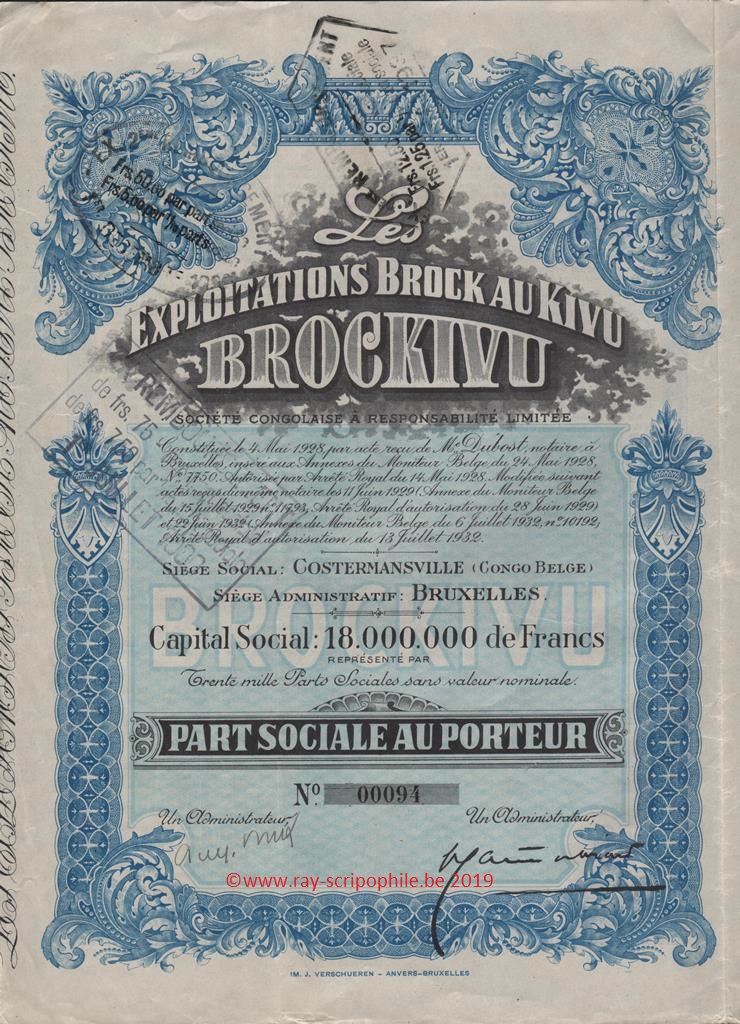LES EXPLOITATIONS BROCK AU KIVU - BROCKIVU S.C.A.R.L.
Constitution
The S.C.A.R.L. Les exploitations Brock au Kivu, abbreviated to "Brockivu", was founded on May 4, 1928; its head office was established in Costermansville and the administration in Brussels.
The share capital was set at 12 million francs and was represented by 120,000 shares of 100 francs each.
The 120,000 shares of 100 francs were subscribed for by:
S.A. La Foncière et Mobilière, 14,200 shares; S.A. La Foncière et Mobilière for itself and for a group, 90,000 shares; Count Henry Carton de Wiart, 300 shares; Baron Jean de Broqueville, 300 shares; Arsène de Launoit, 300 shares; Edmond Pirlot, 300 shares; Baron Frédéric de Menten de Horne, 100 shares; Paul Houtart, 100 shares; Raymond Brock, 14,400 shares.
The shares were paid up by 20%, i.e. 2,400,000 francs made available to the new Company.
First Board of Directors
The number of directors was set at five members and two commissioners.
Object
Changes in capital, event(s), shareholding(s), quotation
The company took over the coffee plantations carried out in Kivu by Mr. Brock, in the Rutaha and Nyantende concessions.
1929 - An extension of about 500 hectares was started: 700,000 coffee trees and 250,000 eucalyptus trees were distributed in the concessions.
The reputation of Kivu coffee was well established; Kivu coffee occupied the same place in the London market as Kenyan coffee (21-(1931 T3) -430/31).
On June 11, the capital was increased to 30 million francs by the creation of 180,000 new shares of 100 francs each, subscribed at par by Foncière et Mobilière and offered to former shareholders at a price of 105 francs, on the basis of 3 new shares for every 2 old shares.
The capital increase allowed to participate in two companies:
- Société Chantiers et Cultures au Kivu (Chaki), incorporated on July 9, 1929 with a capital of 5.5 million francs; Brockivu subscribed to 9,903 shares of 500 francs. The main interest of this business was the exploitation of a forest concession and the installation of a sawmill and joinery.
- The Company Plantations de la Loashi (Planoa), incorporated on September 16, 1929 with a capital of 1,320,000 francs, of which Brockivu took a significant part of the capital, i.e. 2,361 shares of 500 francs. Planoa was a partially scientific organization in charge of researching, in the best conditions of soil, climate and altitude, which crops were likely to give Kivu an interesting yield. The costs incurred were to be covered by the proceeds of food crops.
In addition to these two companies, the Company took significant interests in other companies whose aim was to develop the Kivu region, particularly in the subsidiaries created by the Comité National du Kivu (21-(1931 T3) -430/31).
1930 - Efforts were directed towards the improvement of crops and above all towards the perfection of cultivation methods and ways and the careful preparation of products. The Society used the advice of agronomists and coffee cultivation specialists from the Société Auxiliaire Agricole du Kivu. The Company Plantations de Zobia in the Uélé was added to the subsidiaries mentioned above (21-(1931 T3) -430/31).
1931 - The Société Chantiers et Cultures au Kivu felt the crisis reaching Kivu; the exclusively agricultural Société Plantations de la Loashi was developing well; the Société Plantations de Zobia, the plantations in the Uélé (Robusta coffee and Elaeis palm plantations) were developing encouragingly (21-(1932 T3) -388/89).
1932 - The activity continued with the continuation of the development of the concessions and the continuation of the works and the sanitation measures recommended by the experts. The plantations in Kivu yielded the expected harvest, but unfortunately the selling price of coffee continued to fall, and the revenue was affected.
The Société Chantiers et Cultures au Kivu ceased all activities during the year (21-(1934 T2) -1210 and 1211).
1934 - The forecasts were not met. This situation was not unique and generally speaking all coffee farms had to report a waste during this year, due either to a poor distribution of rainfall in the Kivu region or in the Uélé region due to the destructive action of certain parasites. The loss in crop weight was not compensated for by an improvement in coffee prices, which continued to decline. In view of this unfavorable situation on the world coffee market and the unsatisfactory outlook, the company decided to make significant write-offs.
As for Société Chantiers et Cultures au Kivu, the economic situation in the region did not allow the company to resume activity, even at a reduced level (21-(1935 T3) -110).

Dissolution and liquidation
On July 13, 1935, the sharesholder’s meeting decided to dissolve and liquidate the Brockivu Company (12-(27-07-1935) -11477).
In reference to the stamps on the share, several reimbursements were distributed to the shareholders, namely:
01/07/1936 - 75 frs per share and 7.50 frs per 1/10 of share
01/12/1936 - 50 frs per share and 5 frs per 1/10 of share
01/05/1937 - 12.50 frs per share and 1.25 frs per 1/10 of share
On July 20, 1938, the liquidation of the Company was completed (12-(03-08-1938)-12140).



